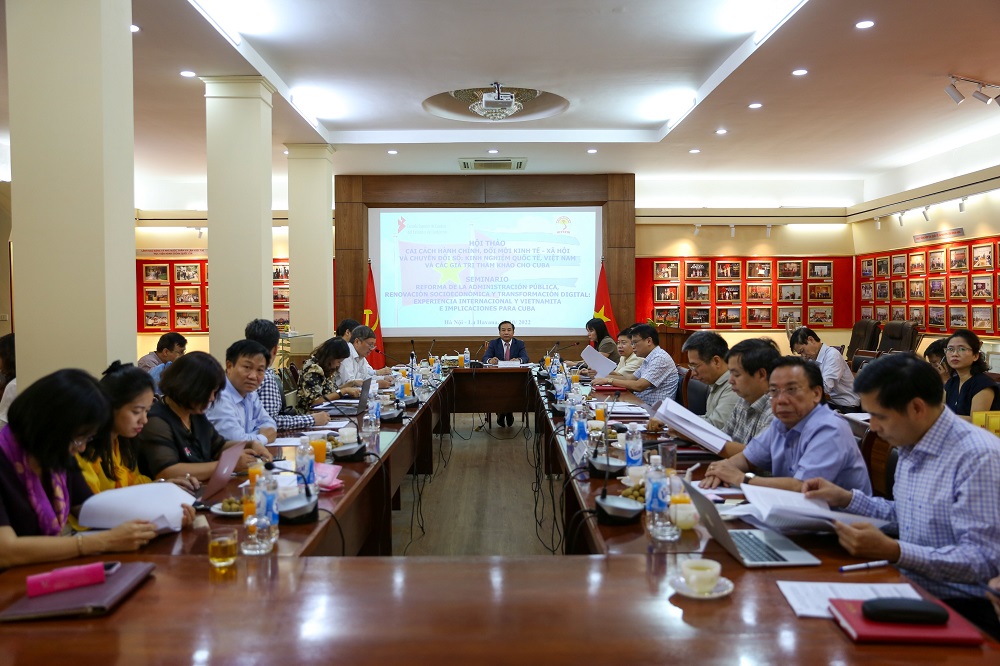(Quanlynhanuoc.vn) – On October 31, 2022, in Hanoi, Viet Nam and Havana, Cuba, the National Academy of Public Administration (NAPA) and the Higher School of State and Government Cadres of Cuba (Spanish: Escuela Superior de Cuadros del Estado y del Gobierno – ESCEG) co-organized an international workshop entitled “Reform of public administration, socio-economic renewal and digital transformation: International experience and Vietnamese experience and implications for Cuba”. Dr. Nguyen Dang Que, NAPA Executive Vice President and Prof. Mercedes Delgado Fernandez, ESCEG Rector, co-chaired the Workshop.
Attending the Workshop, on the side of Cuba were Ms. Rosabel Gammón Verde, First Vice Minister, Ministry of Justice; Ms. Grisel Reyes León, Vice Minister of the Ministry of Communications; Mr. Orlando Nicolas Hernandez Guillen, Cuban Ambassador Extraordinary and Plenipotentiary to Viet Nam; staff of the Cuban Embassy in Viet Nam; leaders, staff, lecturers of ESCEG and more than 70 delegates from 20 ministries, central and local agencies of Cuba.
On the side of Viet Nam, there were representatives from the Ministry of Home Affairs (MoHA) and a number of ministries, branches, and central and local agencies of Viet Nam. From NAPA, there were Vice Presidents Assoc.Prof.Dr. Luong Thanh Cuong and Dr. Lai Duc Vuong; representatives of units, officials, trainers, students, and researchers. The workshop was held in a hybrid format, broadcast live to the NAPA Branch campuses in Ho Chi Minh City, Hue City and Tay Nguyen, with over 100 delegates participating online.
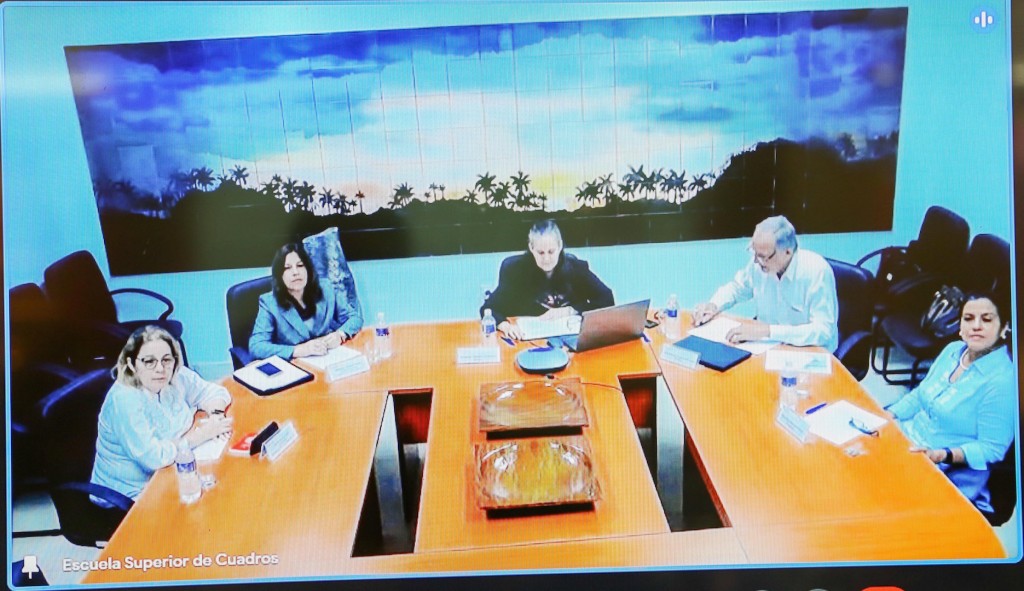
Prof. Fernandez, ESCEG Rector, speaking at the opening of the Workshop and acknowledging NAPA’s cooperation in organizing the Workshop.
Speaking at the opening of the Workshop, Prof. Fernandez, ESCEG Rector would like to acknowledge the cooperation of NAPA in organizing the Workshop; she also emphasized the meaning and importance of the Workshop for Cuban scholars and leaders and managers in the context of radical reform in Cuba, arising administrative reform requirements, socio-economic renewal, and promotion of digital transformation. Prof. Fernandez highly appreciated valuable lessons learned from the renewal practices initiated and led by the Communist Party of Viet Nam; she determined that public administration reform, socio-economic renewal, and digital transformation have an organic relationship and play an important role in implementing the Party’s resolutions and the State’s tasks.
Speaking at the opening of the Conference, Dr. Nguyen Dang Que highlighted the significance of the Workshop in the context of Cuba’s determination to carry out drastic reforms in all areas of social life with the main goal of updating the development model and opening up the economy in order to adapt to the development needs of the country and the volatile world situation. Cuba has identified 31 countries – 31 economic models with 51 issues that can be considered good models and good practices. Viet Nam is honored to be one of the positive role models for Cuba to learn from.
According to Dr. Nguyen Dang Que, public administration reform, socio-economic renewal, and digital transformation are all great changes and have far-reaching impacts while posing many obstacles. The successful implementation of such areas would require political determination. The historically significant achievements of a 35-year-reform-process affirm that the renewal policy of the Communist Party of Viet Nam is creative and on the right track; Viet Nam’s path to socialism is in line with the realities and development trends of the times. Despite many difficulties ahead, Viet Nam has always been a bright spot in the region and the world in terms of national renewal and development. With nearly 40 years of experience in national reform and renewal, Viet Nam is very honored and willing to share its lessons with Cuba, contributing to Cuba’s successful implementation of the renewal and development process and supporting Cuba in developing and building the foundation for a prosperous and happy society.

Cuban Ambassador Extraordinary and Plenipotentiary to Viet Nam H.E. Orlando Nicolas Hernandez Guillen highly appreciating the effective cooperation between NAPA Viet Nam and Cuba ESCEG.
Addressing the Workshop, Cuban Ambassador Extraordinary and Plenipotentiary to Viet Nam H.E. Orlando Nicolas Hernandez Guillen highly appreciated the effective cooperation between NAPA Viet Nam and ESCEG Cuba. Referring to Viet Nam’s reform and renewal experience, Ambassador Guillen affirmed that Viet Nam’s success in maintaining macroeconomic stability and ensuring major economic balances stems from effective and flexible policies of the Party and Government. Viet Nam’s consistency, perseverance, and resoluteness in the implementation of its foreign policy in order to ensure security and peace, create favorable conditions for economic development, attract foreign investment, promote the international integration process, and elevate diplomatic relations with all neighboring countries, major countries, important partners, and friends are meaningful lessons for the reform and renewal in Cuba.
At the Workshop, Vietnamese and Cuban scholars focused on discussing and sharing experiences on the following topics: (1) The process of public administration reform, socio-economic renewal and digital transformation in Viet Nam and Cuba; (2) The importance, meaning and organic relationship among public administration reform, socio-economic renewal and digital transformation; (3) Practices of public administration reform, socio-economic renewal and digital transformation in Viet Nam and Cuba: opportunities and challenges of reform and renewal; (4) Viet Nam’s experience and good practices in reform of public administration, socio-economic renewal and digital transformation, determining relevance, policy implications and applicability of Viet Nam’s experience into Cuban practice; (5) Identifying the requirements and necessary competencies of public leaders and managers to meet the requirements of reform of public administration, socio-economic renewal and digital transformation in each country.
5 presentations by Cuban and Vietnamese experts were presented at the workshop. The presentation ” Overview of the administrative reform in the updating of the economic and social model in Cuba” by Ms. Rosabel Gamón Verde, First Vice Minister, Ministry of Justice of Cuba clearly showed the role of the Ministry of Justice in supporting the State and Government of Cuba with legal issues to promote the reform process. The presentation provided an overview of the process and results of implementing the judicial reform plan as well as building the legal system and international treaties in Cuba.
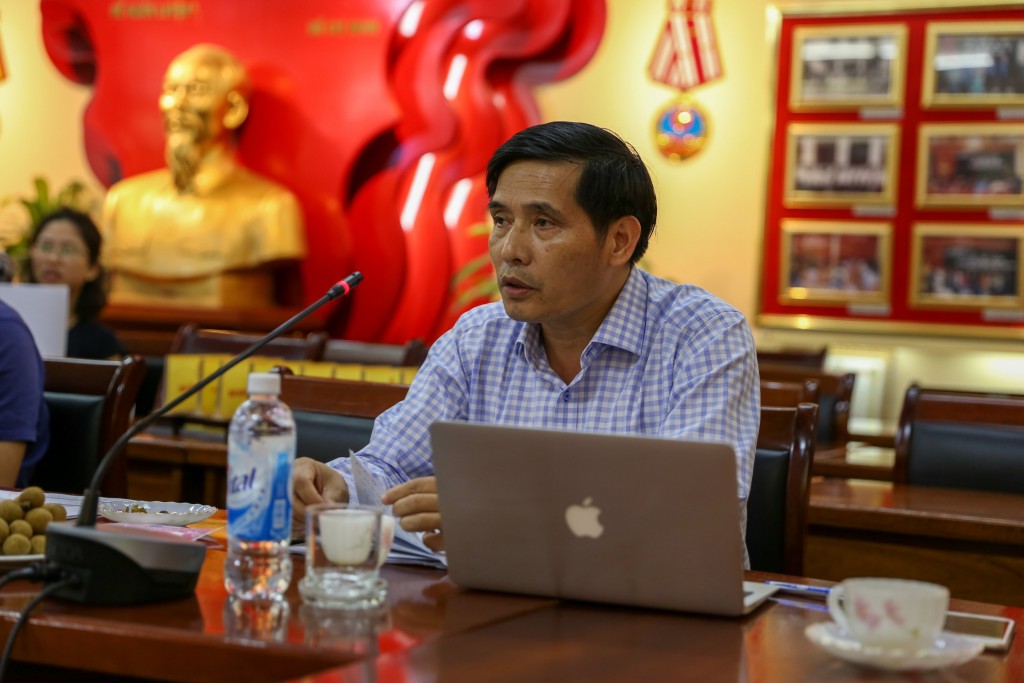
Assoc.Prof.Dr. Nguyen Hoang Hien, Director General of the NAPA Branch Campus in Hue City clarifying the renewal of thought on economic growth
The presentation on “Renewal of thought on economic growth for the development of the country and policy implications for Cuba” by Dr. Nguyen Dang Que, NAPA Vice President and Assoc.Prof.Dr. Nguyen Hoang Hien, Director General of the NAPA Branch Campus in Hue City focused on (1) clarifying the awareness of renewal of thought on economic growth, (2) presenting an overview of the renewal of thought on Viet Nam’s economic growth, and then (3) drawing some policy implications from Viet Nam’s experience for Cuba’s economic growth.
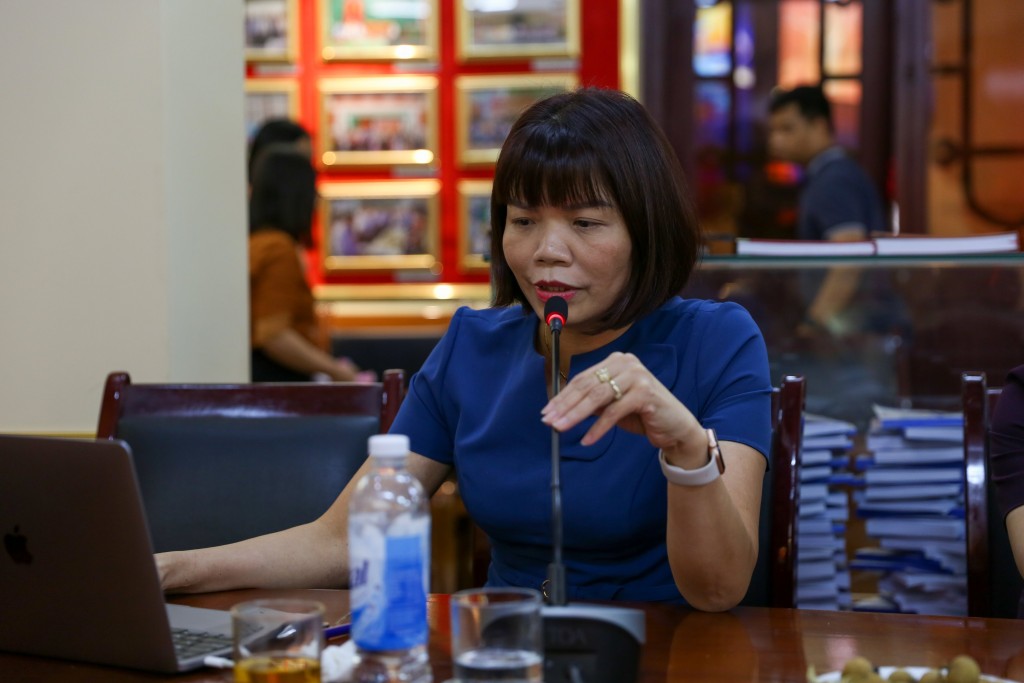
Assoc.Prof.Dr. Nguyen Thi Hong Hai, Dean of the Faculty of Administrative Sciences and Organization – Personnel Management presenting the overall picture of the reform of public administration in Viet Nam.
With her presentation “Public administration reform for socio-economic development in Viet Nam: achievements, challenges and prospects”, Assoc. Prof. Dr. Nguyen Thi Hong Hai, Dean of the Faculty of Administrative Sciences and Organization – Personnel Management, presented the overall picture of the reform of public administration in Viet Nam and the basic administrative reform results in some areas (e.g. institutional reform, reform in administrative procedure, building and improving the quality of the contingent of cadres, civil servants and public employees, public finance reform). The presentation also evaluates the achieved results as well as the shortcomings and limitations, thereby drawing 6 great lessons that Cuba can refer to from the public administration reform practice in Viet Nam.
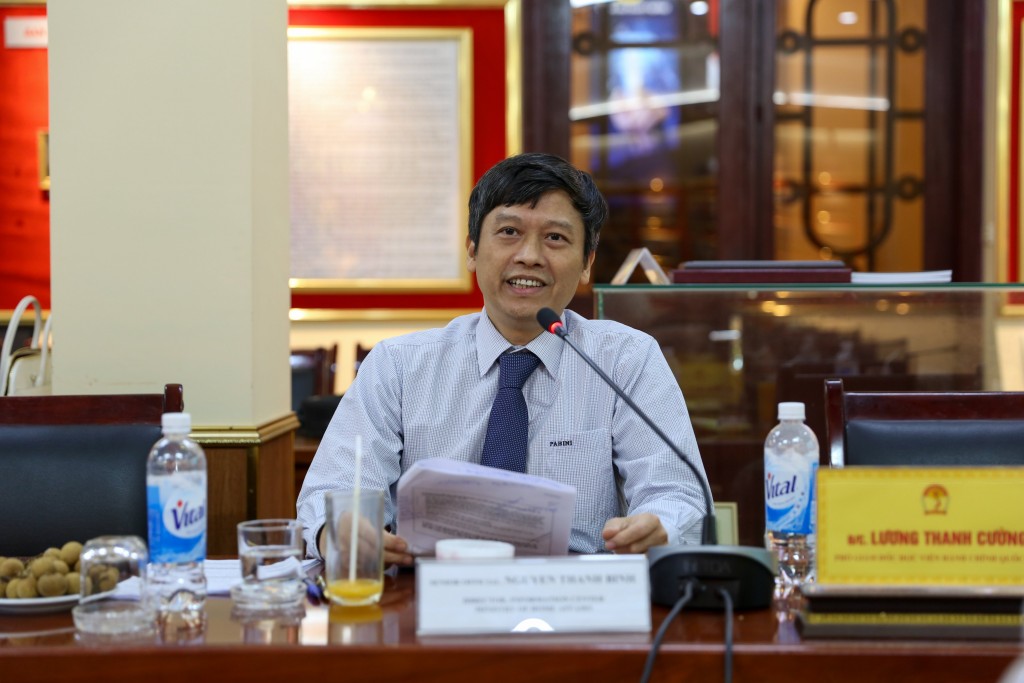
Mr. Nguyen Thanh Binh, Director of Information Center, MoHA, with the presentation “Digital Transformation for Public Administration Renewal and Reform Requirements in Viet Nam”.
Mr. Nguyen Thanh Binh, Director of Information Center, MoHA, with the presentation “Digital transformation for public administration renewal and reform requirements in Viet Nam” introduced the overall picture of digital transformation in close relationship with public administration reform in Viet Nam, digital transformation practices at MoHA Viet Nam, and challenges of this transition from his perspective of a leader working in the Home Affairs industry, an information technology director of the MoHA, and a customer/citizen using digital services provided by the Government.
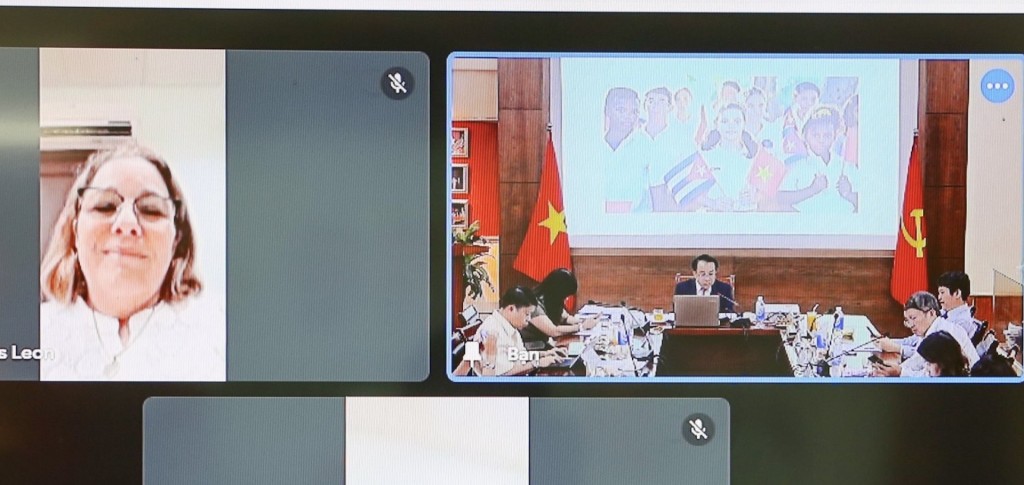
Ms. Grisel Reyes León, Vice Minister of the Ministry of Communications of Cuba with the presentation “Digital transformation in Cuba: current situation and challenges”.
Ms. Grisel Reyes León, Cuban Vice Minister of Communications presented the presentation “Digital transformation in Cuba: current situation and challenges”. Her presentation introduced four facilitating factors in the digital transformation process that the Cuban Government has identified and focused on developing, including human factors, technology, processes, and data. According to Ms. León, Cuba is facing a complex and challenging process that requires comprehensive diagnoses of the situation and assessment of digital maturity levels achieved at each step; only then can the country formulate policies to promote the use and development of technology, socio-economic development, and reform in Cuba.
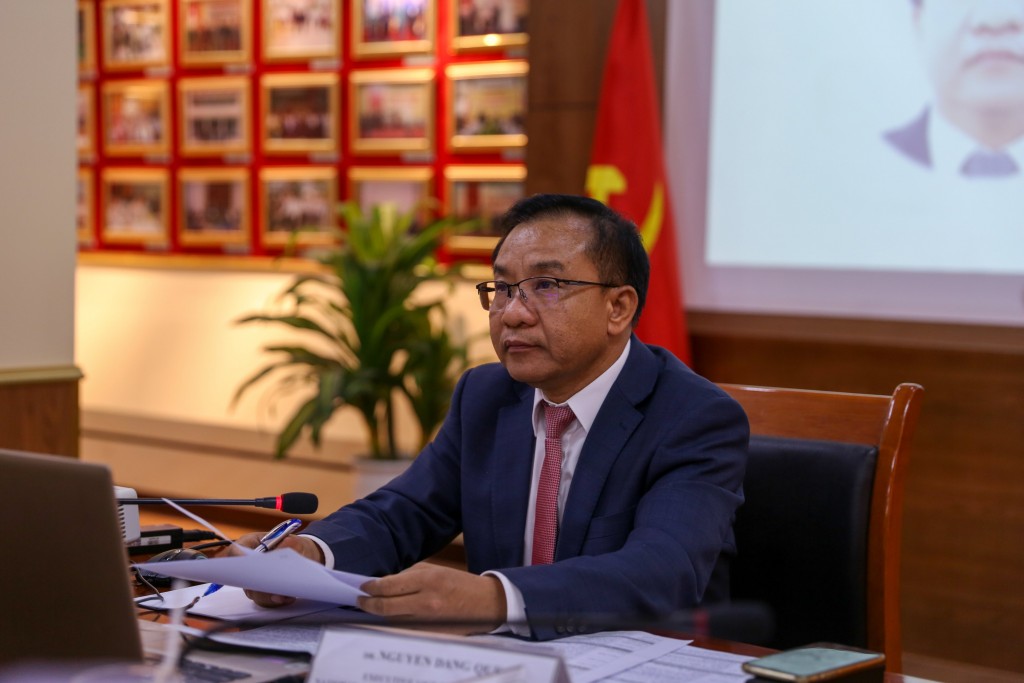
Dr. Nguyen Dang Que delivering the closing remark of the Workshop, highly appreciating the meaning and value of the Workshop.
In the closing speech of the Workshop, Dr. Nguyen Dang Que affirmed the effectiveness and value of the Workshop. He highly appreciated the sense of responsibility and active participation of the presenters as well as the participants of the Workshop. On the basis of this Workshop, the two sides need to continue to exchange and select specific topics to discuss further, analyze, and share experiences for the next workshops. The Workshop Organizing Committee will gather the papers of the participants to publish the Workshop proceedings in Vietnamese, Spanish, and English.
Speaking at the closing of the Workshop, Prof. Fernandez, ESCEG Rector, thanked the very active participation of Vietnamese and Cuban leaders, delegates, and speakers at the Workshop. She suggested that NAPA and ESCEG continue to closely coordinate, promote the exchange of experiences and cooperation in training, researching, and publishing, especially focusing on the practical contents of reform and renewal.
News, photos: Quynh Hoa, Xuan Phu


